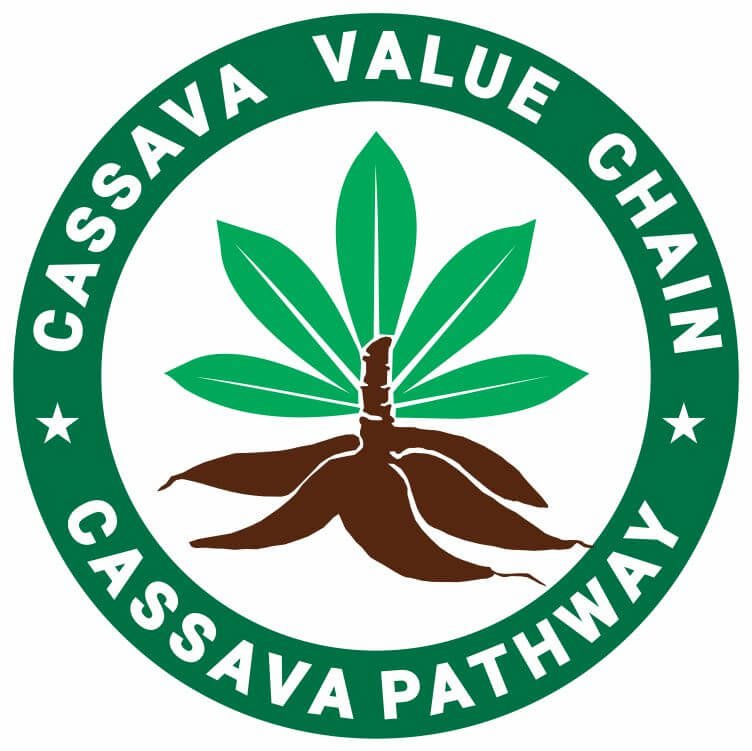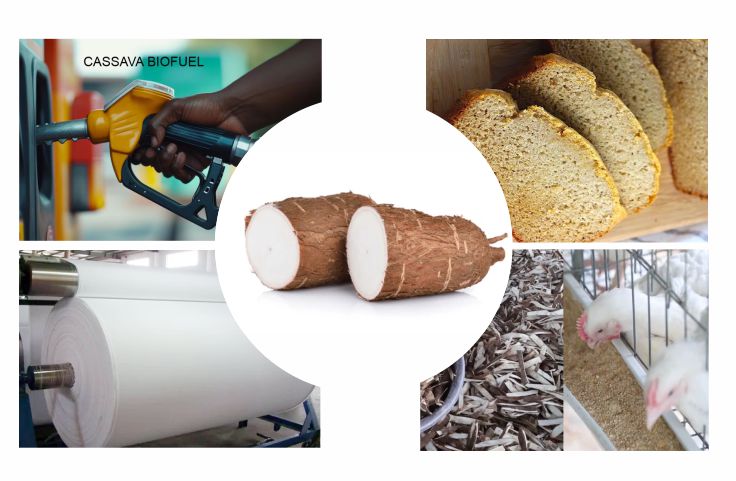Get familiar with the industrial benefits of cassava, an eco-friendly, cost-effective crop revolutionizing food, biofuel, textiles, and more.
Cassava is a highly adaptable crop with a growing presence in industrial sectors. While widely known as a food staple, its applications extend far beyond the kitchen.
Across industries, cassava serves as a key ingredient in textiles, pharmaceuticals, adhesives, and biodegradable materials.
Its high starch content makes it valuable for bioethanol production, offering a sustainable alternative to fossil fuels.
The food industry also benefits from cassava-based gluten-free products, catering to changing consumer demands.
As industries seek eco-friendly and cost-effective resources, cassava continues to prove its versatility.
This article explores the industrial benefits of cassava and its application, shedding light on how this resilient crop is driving innovation and sustainability across multiple sectors. See all the benefits of cassava.
Related: The Benefits of Cassava to the Environment

Industrial Benefits of Cassava
Cassava has proven itself to be not just a crop. Its starch-rich roots make it valuable across multiple industries, from food production to renewable energy.
Its ability to replace synthetic ingredients and reduce environmental impact has made it a preferred choice in manufacturing and agriculture.
Let’s look closely at some of the industrial benefits of this supercrop:
1. Food and Beverage Industry
One of the foremost industrial benefits of cassava is its application in the food and beverage industry.
Its high starch content makes it a key ingredient in food production. It acts as a thickener in soups, sauces, and gravies while serving as a binding agent in processed foods.
Gluten-free products rely on cassava starch as a wheat alternative, catering to those with gluten intolerance.
Sweeteners derived from cassava, like high-fructose cassava syrup, provide a cost-effective sugar substitute.
Its enzymatic conversion process offers manufacturers a sustainable option compared to cane or beet sugar.
Cassava also plays a role in alcohol production. Its fermentable sugars are used in brewing cassava-based beers, supporting local economies.
Additionally, cassava-derived ethanol contributes to renewable energy efforts.
With its expanding use in food, beverages, and sweeteners, cassava continues to be a valuable resource for manufacturers seeking cost-effective and sustainable alternatives.
Related: Health Benefits of Cassava
2. Textile and Paper Manufacturing
Another industrial application of cassava is textile and paper manufacturing. Cassava starch plays a key role in textile and paper production.
In textiles, it strengthens yarn during sizing, improving durability and weaving efficiency.
Its biodegradable nature makes it a cost-effective and eco-friendly choice for manufacturers.
Cassava starch also enhances textile finishes, improving fabric texture and performance while reducing reliance on synthetic chemicals.
In the paper industry, cassava starch improves paper smoothness and brightness, enhancing print quality and ink absorption.
It is also used in adhesives for bookbinding and packaging, ensuring strong, flexible bonds.
As sustainability becomes a priority, cassava starch offers a renewable alternative to synthetic materials.
Its widespread use in textiles and paper underscores its value in improving product quality while supporting eco-friendly manufacturing practices.
Related: 34 Benefits of the Cassava Root
3. Pharmaceutical and Cosmetic Sectors
The third industrial benefit of cassava is in the pharmaceutical and cosmetic industries.
Cassava starch is widely used in pharmaceuticals as a binding agent in tablets, ensuring stability and controlled drug release.
Its purity and efficiency make it a preferred choice for extended-release medications, improving drug absorption and patient adherence.
In cosmetics, cassava-derived ingredients act as natural thickeners and emollients in creams, lotions, and hair care products.
They enhance texture, retain moisture, and promote skin hydration, making them ideal for skincare formulations.
Beyond functionality, cassava offers a sustainable alternative to synthetic ingredients.
Its renewable nature supports eco-friendly manufacturing, aligning with the rising demand for natural products.
As the pharmaceutical and cosmetic industries prioritize sustainability, cassava’s role continues to expand, reinforcing its importance in modern formulations.
4. Biofuel and Renewable Energy Solutions
The fourth industrial application of cassava is a leading raw material for biofuel and renewable energy.
Cassava has become a sustainable energy source, particularly in bioethanol production.
Its high carbohydrate content makes it an efficient raw material for biofuel, offering an alternative to fossil fuels.
When processed into bioethanol, cassava helps reduce reliance on petroleum-based fuels and lowers greenhouse gas emissions.
Beyond its fuel potential, cassava’s adaptability makes it a viable option for energy production in diverse climates.
It grows in marginal soils with minimal chemical inputs, making it an eco-friendly choice for biofuel industries.
Advances in fermentation and extraction methods continue to improve efficiency, reducing production costs and making cassava-based fuels more competitive.
With increasing demand for cleaner energy, cassava plays a growing role in sustainable solutions.
Its use in bioethanol supports energy diversification while promoting agricultural sustainability, positioning it as a key contributor to renewable energy efforts.
See more on how cassava biofuel works.
5. Adhesives and Biodegradable Plastics
The fifth industrial benefit of cassava is in its application in adhesive and biodegradable plastics.
Cassava starch is a key ingredient in eco-friendly adhesives, offering strong bonding properties for packaging, textiles, and woodworking.
Unlike petroleum-based adhesives, cassava-based alternatives are biodegradable, aligning with global sustainability goals and consumer demand for green products.
The starch also plays a vital role in biodegradable plastic production. Cassava-derived polymers provide a sustainable alternative to traditional plastics, reducing environmental waste.
These bioplastics are used in food packaging and disposable products, offering the same functionality with a lower ecological footprint.
As industries shift toward sustainable solutions, cassava-based adhesives and bioplastics present an innovative way to reduce reliance on synthetic materials.
Their versatility and environmental benefits make cassava an essential resource for eco-conscious manufacturing.
6. Animal Feed Industry
Cassava is a valuable feed source for livestock, providing a rich supply of energy due to its high starch content.
Properly processed cassava serves as an alternative to traditional feed ingredients like maize, making it a cost-effective option for farmers.
Ruminants and monogastric animals benefit from cassava-based feed, which supports growth and overall health.
When supplemented with protein-rich additives, cassava helps create balanced diets for livestock.
Additionally, its availability in regions with fluctuating grain prices offers a stable feed source, reducing dependency on expensive imports.
By incorporating cassava into animal nutrition, farmers can optimize feed efficiency while supporting local agriculture.
Its role in livestock feeding highlights its economic and agricultural significance, ensuring a sustainable and affordable solution for food production.
See a dedicated post on cassava in livestock feed formulation.
Challenges and Future Prospects of Industrial Application of Cassava
Post-Harvest Losses and Processing Issues
Cassava is highly perishable, making quick and efficient processing essential.
Delays in transportation and outdated processing techniques lead to significant losses, reducing product quality and profitability.
A lack of modern facilities worsens this issue, forcing many farmers to sell their harvests at lower prices.
Fragmented Supply Chain
Most cassava comes from small-scale farmers with limited access to modern farming tools, reliable storage, and financial support.
This leads to inconsistent supply, making it difficult for industries to secure a steady flow of raw materials.
Poor infrastructure and logistical challenges further disrupt market stability.
Technological Innovations and Future Growth
New processing technologies, such as enzymatic starch extraction, are improving efficiency and product quality.
Digital tools for supply chain tracking help reduce waste and streamline logistics.
With continued investment, cassava can become a key resource in biofuels, bioplastics, and sustainable food production.
Frequently Asked Questions
How does cassava contribute to the food industry?
Cassava starch is used in gluten-free products, sweeteners, and food thickeners, providing cost-effective, sustainable alternatives to wheat and sugar.
Can cassava replace petroleum-based products?
Yes, cassava-derived bioethanol and biodegradable plastics offer eco-friendly alternatives to fossil fuels and synthetic materials, reducing environmental impact.
What role does cassava play in the pharmaceutical industry?
Cassava starch acts as a binder in tablets, ensuring stability and controlled drug release, making it essential for medication formulations.
Why is cassava a preferred choice in renewable energy?
Cassava’s high starch content makes it an efficient biofuel source, helping reduce greenhouse gas emissions and dependence on fossil fuels.
Conclusion
Cassava’s versatility makes it a game-changer in industrial applications.
From food and pharmaceuticals to textiles, adhesives, and renewable energy, its starch-rich roots offer sustainable, cost-effective alternatives.
As industries seek eco-friendly materials, cassava continues to gain prominence, reducing reliance on synthetic ingredients.
Innovations in processing and supply chain management are addressing challenges, paving the way for broader adoption.
With its ability to support both economic growth and sustainability, cassava is poised to revolutionize multiple industries.
By investing in cassava-based technologies, we can unlock new opportunities, promoting a greener, more resource-efficient future.
References
- PubMed: Industrial applications of cassava
- ScienceDirect: Cassava Starch: Chemical Modification and Its Impact on Functional Properties and Industrial Applications
- SCIRP: White Gold: Cassava as an industrial base

Chimeremeze Emeh is a writer and researcher passionate about Africa’s most transformative root crop—cassava. Through his work at cassavavaluechain.com, he explores the entire cassava industry, from cultivation and processing to its diverse applications in food, health, and industrial use.
He also writes for palmoilpalm.com, where he shares his extensive experience and deep-rooted knowledge of palm oil, covering red palm oil, palm kernel oil, and refined products. His work there reflects his lifelong connection to agriculture and his commitment to promoting sustainable value chains in Africa.
Driven by curiosity and purpose, Chimeremeze aims to shed light on how cassava continues to empower communities, strengthen food systems, and link traditional farming wisdom with modern innovation.

